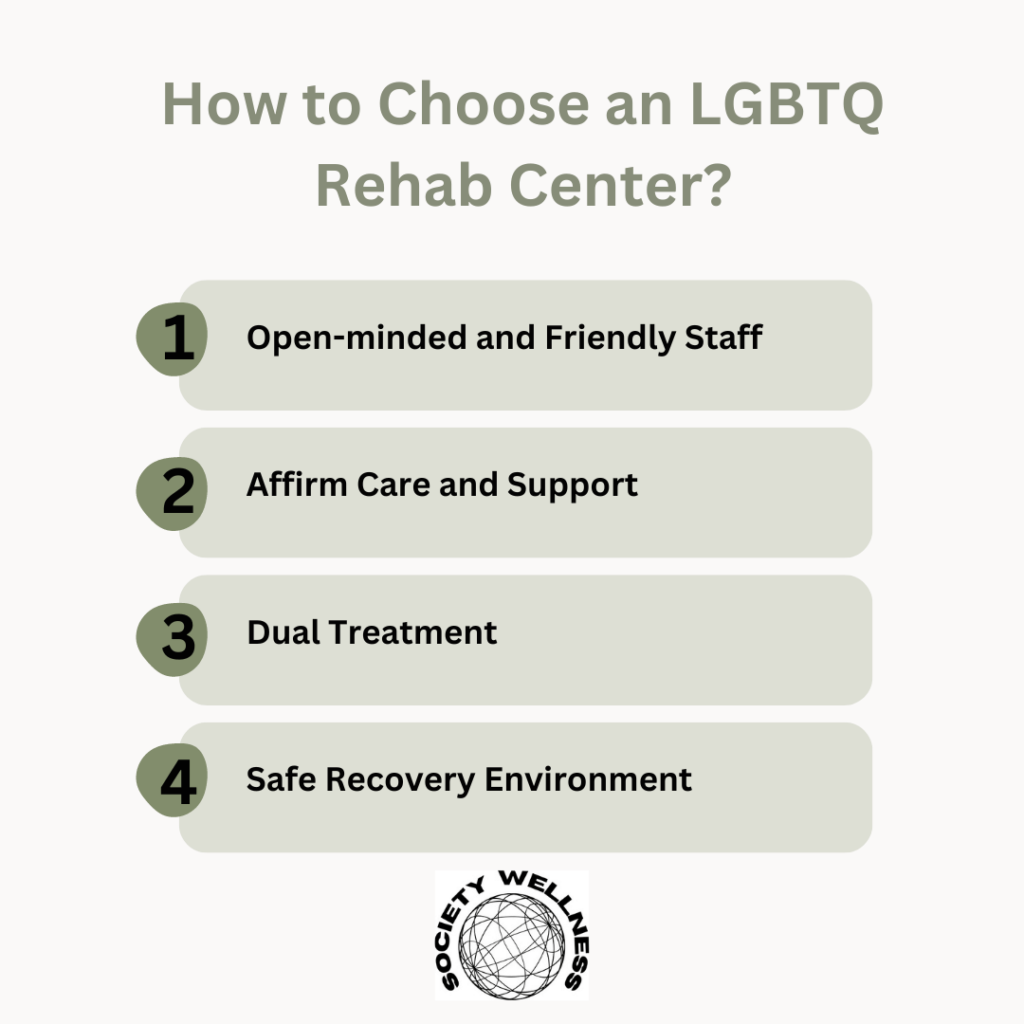Addiction affects people of all backgrounds and has no bounds. Substance abuse and addiction, however, disproportionately affect other groups, such as the LGBTQ+ community.
LGBTQ+ treatment is an essential resource for community members looking for expert help to overcome addiction. It offers a route to recovery in a welcoming and secure setting where everyone can concentrate on getting better without worrying about discrimination.
The very first step in recovering is choosing the right LGBTQ rehab center that offers you tailored support for diverse needs. Let’s explore!
What is the LGBTQ Rehab Center?
Rehabilitation, often known as rehab, is a thorough therapeutic approach designed to assist people in overcoming drug or behavior addiction. Therapy, medication, and coping mechanisms are usually used in these programs to promote long-term recovery and avoid recurrence.
Any acceptance-based, gay-welcoming rehab facility serving the LGBTQ+ population is known as LGBTQ rehab. LGBTQ rehabilitation facilities provide specialized support and care to address a range of addictions by taking into consideration their particular requirements and difficulties.
We can say with pride that Society Wellness announces its acceptance of all LGBTQ+ people and notes that it has assisted countless people in kicking addictions and making significant life transformations.
Why Choosing LGBTQ Rehab is Beneficial?
LGBTQ rehab can change your life in numerous ways, such as:
- LGBTQ treatment offers coping skills and effective communication, which can help people build stronger relationships with their friends, family, and partners. LGBTQ+ treatment programs can help the formation of strong, supportive networks, which are essential for long-term recovery, by addressing the effects of addiction on relationships.
- LGBTQ+ rehab can assist those in need in overcoming their addictions and becoming free from their negative impacts. The skills and coping mechanisms used in the treatment will help individuals to maintain sobriety for the long term.
- LGBTQ rehab promotes self-acceptance, which enhances mental health and cultivates a positive self-image. Clients are assisted in accepting their actual identities and overcoming the damaging effects of discrimination and stigma through therapy and support groups.
How to Choose an LGBTQ Rehab Center?
For long-term recovery, choosing the right LGBTQ rehab center is crucial. So, here are the factors you should keep in mind:
1. Open-minded and Friendly Staff
For LGBTQ+ customers, finding a welcoming and understanding atmosphere is essential. The personnel at Society Wellness fosters an environment where people are sympathetic and caring and collaborate to achieve common objectives. Our policy on client admissions and hiring is devoid of any discrimination, and our Alumni coordinator—a proud member of the LGBTQ+ community—is available to offer one-on-one support when clients return from rehab to their regular lives.
2. Affirm Care and Support
Effective treatment requires identifying and meeting each LGBTQ+ client’s specific requirements. One-on-one therapy sessions at Society Wellness allow clients to discuss personal difficulties, and customized detox plans take into account each person’s particular medical needs throughout withdrawal.
3. Dual Treatment
Addicts who identify as LGBTQ+ are more likely to struggle with mental health conditions as well. For example, the prevalence of co-occurring mental health conditions among young people within the transgender population is up to three times higher. With its extensive background in dual diagnosis treatment, Society Wellness offers all-encompassing care and assistance to address the intricate interactions between these conditions
4. Safe Recovery Environment
LGBTQ+ individuals are not always assured of safety and acceptance. Creating a safe, supportive environment where clients can concentrate on their healing and recovery without worrying about prejudice or condemnation is a top priority for Society Wellness.

How LGBTQ Rehab Centers Provide Tailored Support for Effective Treatment and Long-Term Recovery
1. Addressing Identity and Emotional Trauma
For many LGBTQ individuals, the intersection of identity and addiction is complex. The stress of hiding one’s identity, enduring discrimination, or facing rejection from family and friends can lead to emotional trauma that fuels substance use. LGBTQ rehab centers recognize these specific challenges and create programs that focus on healing both addiction and the emotional wounds caused by societal pressures.
Therapists and counselors at LGBTQ-focused rehab centers are trained to handle issues such as:
- Internalized Homophobia or Transphobia: Many LGBTQ individuals struggle with negative beliefs about themselves due to societal stigma. Therapy can help them process and overcome these feelings.
- Trauma Recovery: LGBTQ individuals often experience higher rates of trauma, including hate crimes, bullying, or family rejection. Trauma-informed care is a key component of LGBTQ rehab programs, helping individuals address past pain and develop healthier coping strategies.
2. Culturally Competent Care
Cultural competence is critical in providing effective addiction treatment for LGBTQ individuals. LGBTQ rehab centers employ staff who are not only sensitive to the unique experiences of LGBTQ clients but also trained in providing care that is inclusive, affirming, and respectful of diverse identities.
Key Components of Culturally Competent Care:
- Understanding LGBTQ Terminology: Staff are trained to use inclusive language and understand the significance of gender identity, sexual orientation, and preferred pronouns.
- Creating a Safe Space: The environment at LGBTQ rehab centers is designed to foster a sense of safety and belonging. Patients can share their experiences without fear of being judged or misunderstood.
- Affirming Individual Identities: Treatment plans consider the patient’s unique experiences, whether related to their sexual orientation or gender identity, ensuring that every individual receives personalized and appropriate care.
3. Tailored Mental Health Support
Mental health and addiction are often closely linked, and LGBTQ individuals are more likely to experience mental health issues such as depression, anxiety, and PTSD. LGBTQ rehab centers focus on dual-diagnosis treatment, addressing both addiction and co-occurring mental health conditions simultaneously.
Mental Health Services in LGBTQ Rehab:
- Individual Therapy: One-on-one counseling sessions help individuals explore the emotional and psychological factors contributing to their addiction, with an emphasis on LGBTQ-specific issues.
- Group Therapy: Group sessions allow patients to connect with others who share similar experiences, creating a sense of community and reducing feelings of isolation.
- Holistic Therapies: Many LGBTQ rehab centers incorporate holistic therapies like mindfulness, meditation, and art therapy to address mental health concerns and promote emotional healing.
4. LGBTQ-Specific Peer Support
Recovery is often strengthened by peer support, and LGBTQ rehab centers provide a unique opportunity for individuals to connect with others who understand their struggles. In traditional rehab settings, LGBTQ individuals may feel isolated or misunderstood. However, LGBTQ rehab centers foster a community of shared experiences, where patients can offer each other empathy and encouragement.
Benefits of Peer Support in LGBTQ Rehab:
- Shared Understanding: LGBTQ patients often feel more comfortable discussing their experiences with peers who can relate to their struggles with identity and discrimination.
- Building a Recovery Network: Forming connections with other LGBTQ individuals in recovery can provide ongoing support even after rehab, helping to maintain sobriety in the long term.
- Accountability and Encouragement: Peer support groups offer a space for individuals to hold each other accountable for their recovery goals, while also providing encouragement during difficult times.
5. Comprehensive Aftercare Programs
Recovery doesn’t end when an individual leaves rehab—it’s a lifelong process. LGBTQ rehab centers offer comprehensive aftercare programs to ensure that individuals continue receiving the support they need after treatment.
Key Components of LGBTQ Aftercare:
- LGBTQ-Specific Support Groups: Continuing participation in LGBTQ-focused support groups can help individuals maintain their sobriety by offering a safe space to share experiences and seek advice.
- Ongoing Mental Health Care: Aftercare programs often include continued access to LGBTQ-friendly therapists and counselors who can help individuals manage mental health challenges.
- Relapse Prevention Planning: LGBTQ rehab centers help individuals create personalized relapse prevention plans that take into account their unique triggers and challenges.
6. Family Involvement and Support
Family relationships can be complicated for LGBTQ individuals, especially if there has been rejection or conflict related to sexual orientation or gender identity. However, family involvement can play a crucial role in the recovery process. LGBTQ rehab centers often offer family therapy sessions to help repair and strengthen relationships, providing education on how family members can support their loved one’s recovery journey.
Family Therapy in LGBTQ Rehab:
- Rebuilding Relationships: Family therapy helps address past hurts, fostering healing and understanding between the individual in recovery and their family members.
- Educating Families: Therapists provide education on LGBTQ issues and addiction, helping families better understand the challenges their loved one faces and how to offer support without judgment.
Take Your One Step Toward Healthy Living!
If you’re ready to enjoy the new beginning of your life, Join Society Wellness, an LGBTQ addiction treatment center today for affirming care and support. If you or a loved one is struggling with addiction and identifies as LGBTQ, choose LGBTQ addiction centers could be the key to finding the support and care necessary for a healthier, more fulfilling future. Call us today at: (888) 598-9510.
FAQs: How LGBTQ+ Rehab Centers Provide Tailored Support
What is LGBTQ+ rehab?
LGBTQ+ rehab centers are specialized treatment programs designed to address the unique needs of LGBTQ+ individuals struggling with addiction. These programs offer a safe and inclusive environment where individuals can receive personalized care and support.
Why is LGBTQ+ rehab important?
LGBTQ+ rehab centers are important because they provide a safe and affirming space for individuals to recover from addiction. These programs can help individuals address the unique challenges that LGBTQ+ people may face, such as discrimination, stigma, and minority stress.
How much does LGBTQ+ rehab cost?
The cost of LGBTQ+ rehab can vary depending on the type of program, the location, and your insurance coverage. Some programs may accept insurance, while others may charge out-of-pocket fees.
Does insurance cover LGBTQ+ rehab?
Many insurance plans now cover addiction treatment, including LGBTQ+ rehab programs. However, the extent of coverage can vary depending on your specific plan. It’s important to check with your insurance provider to determine your coverage.
